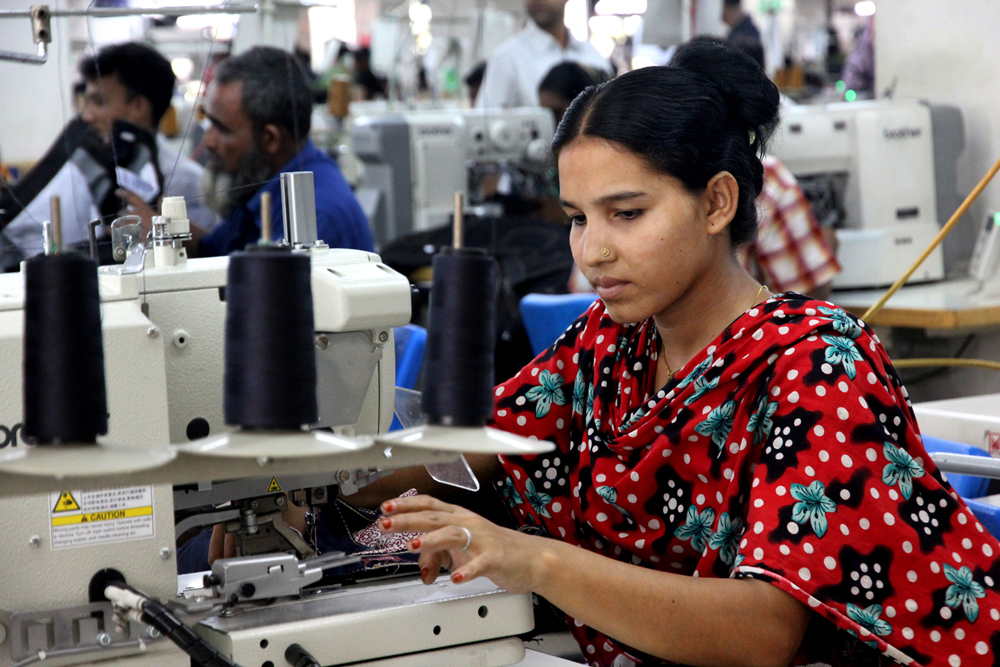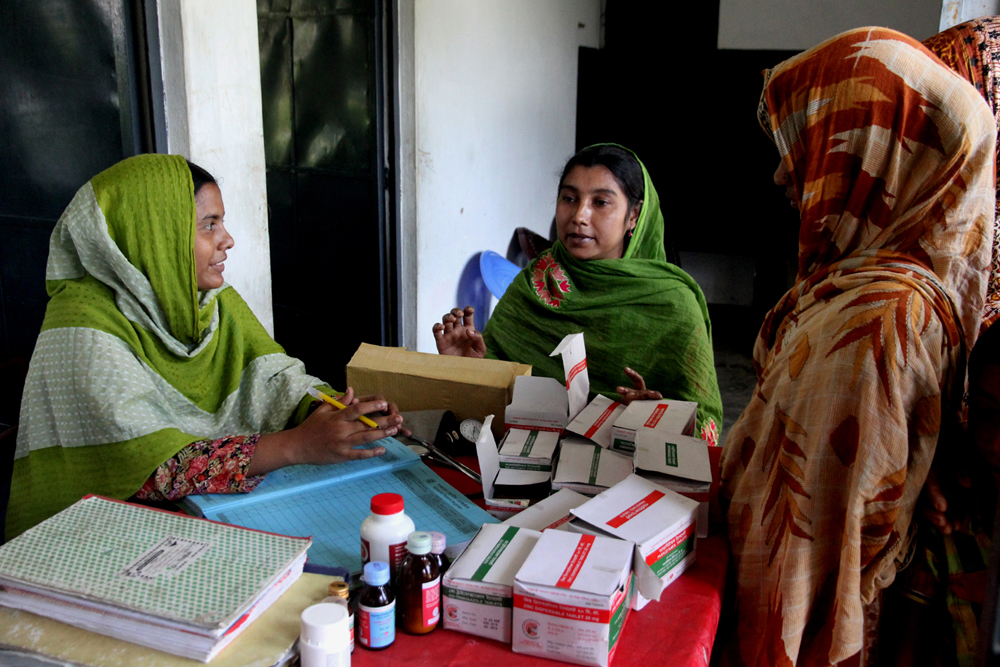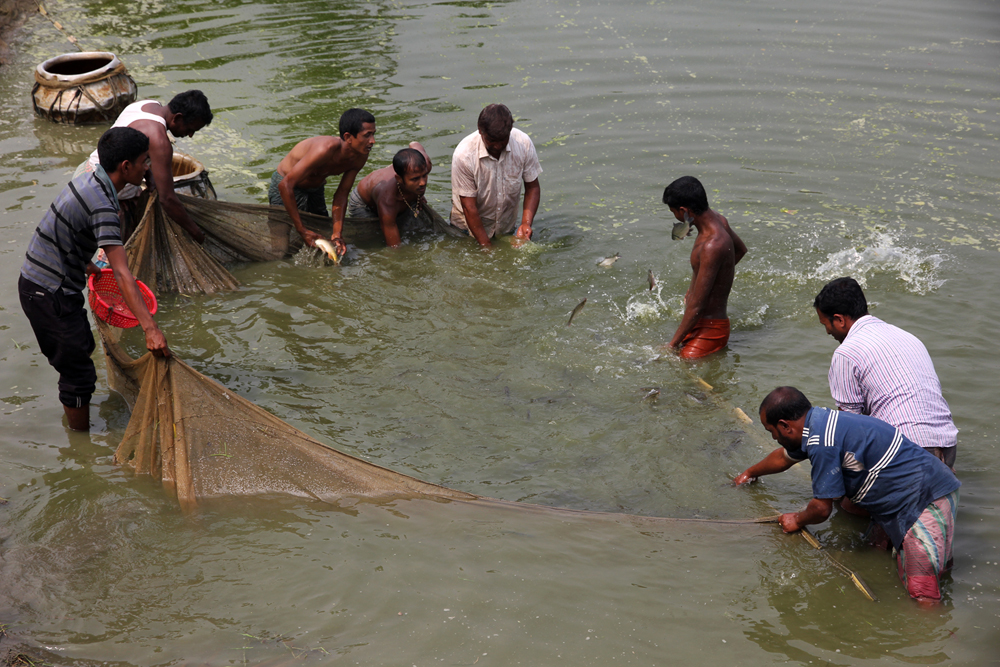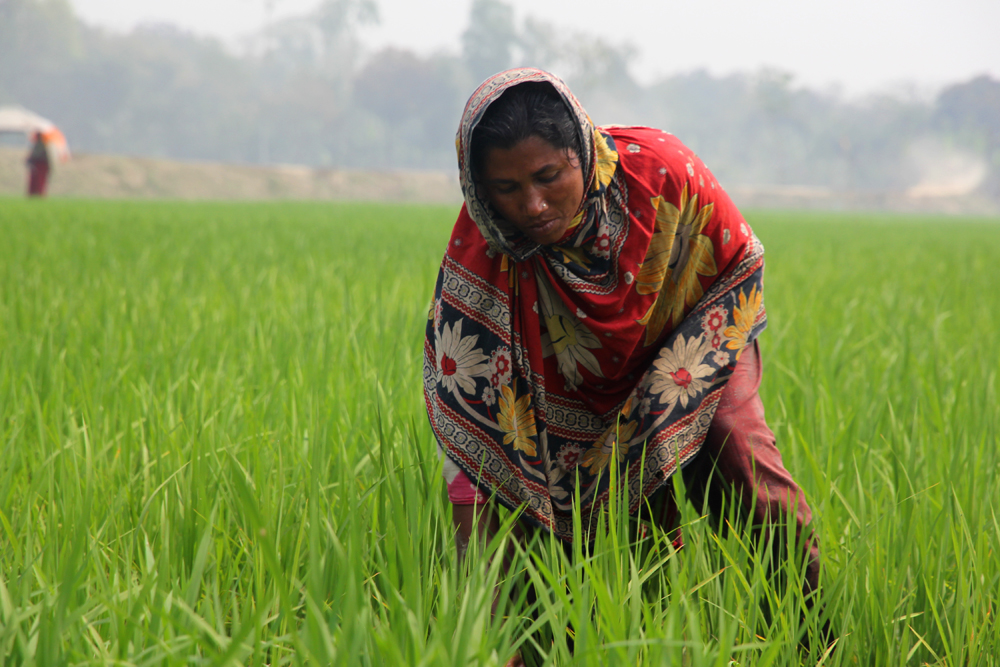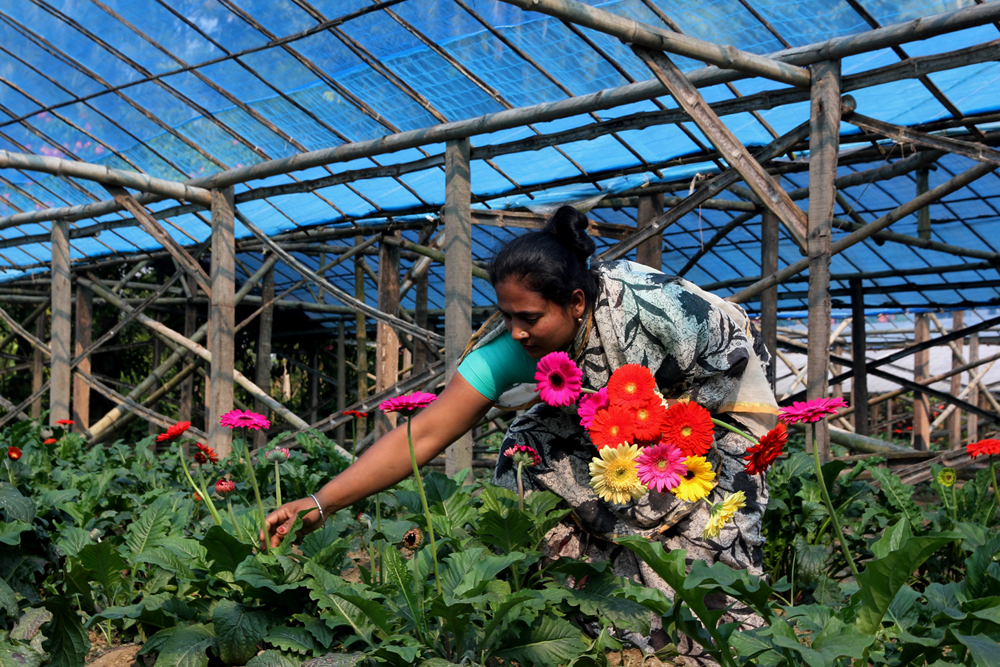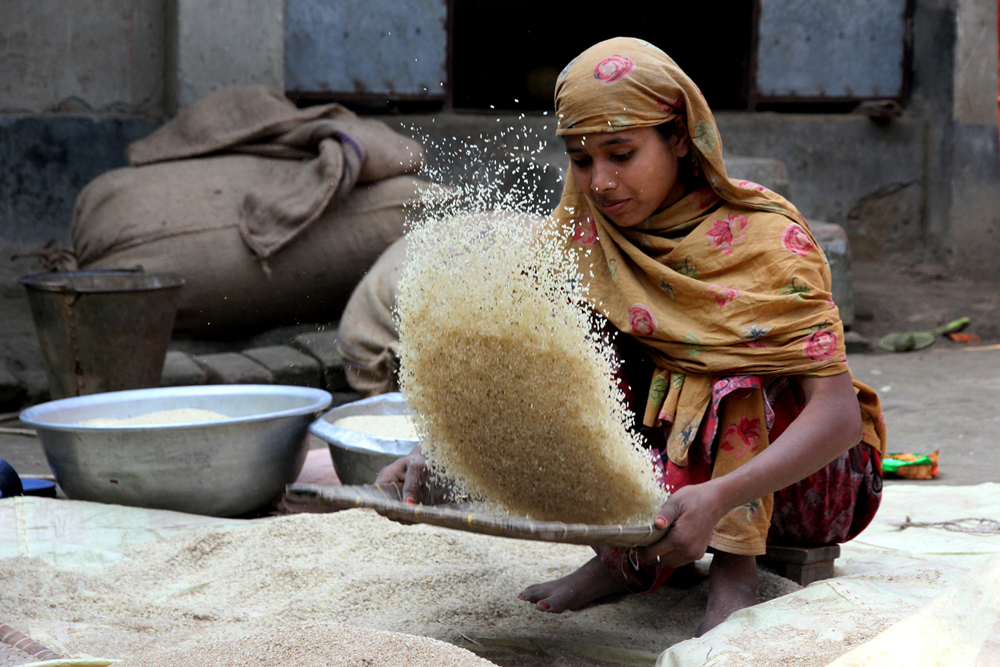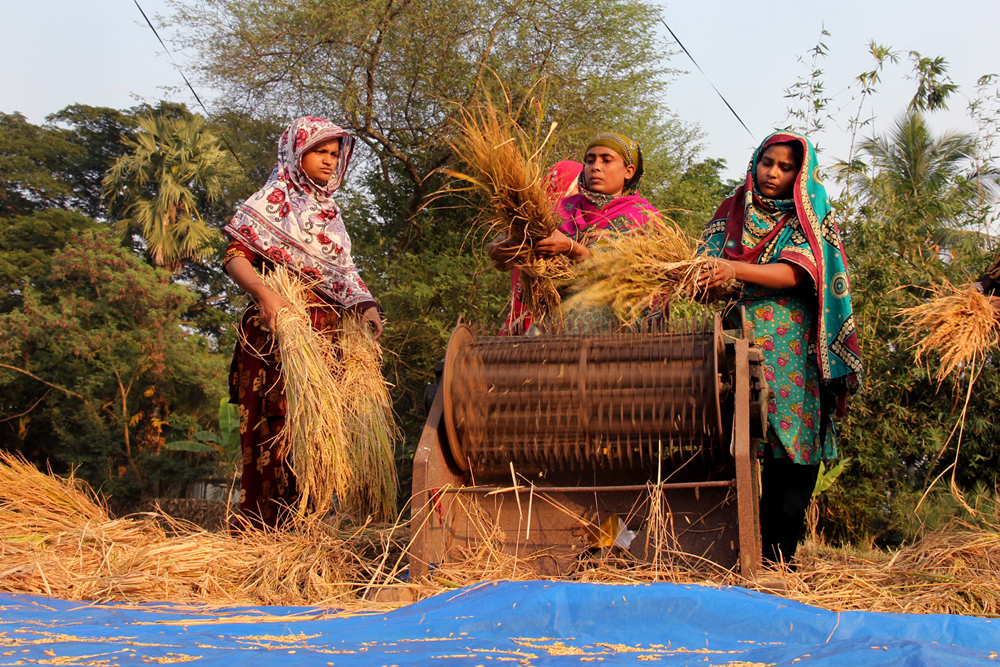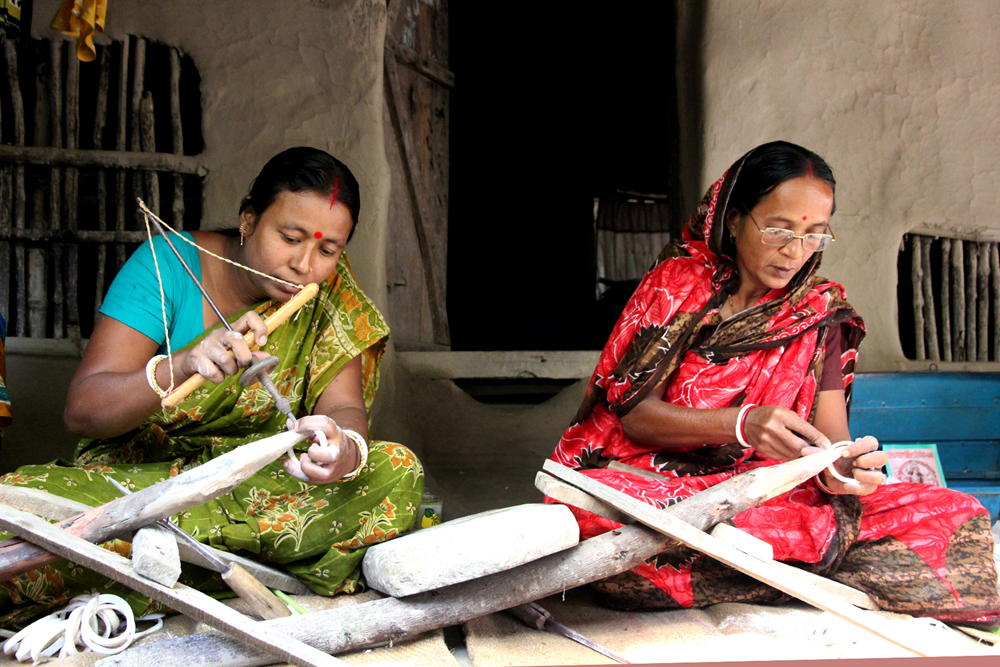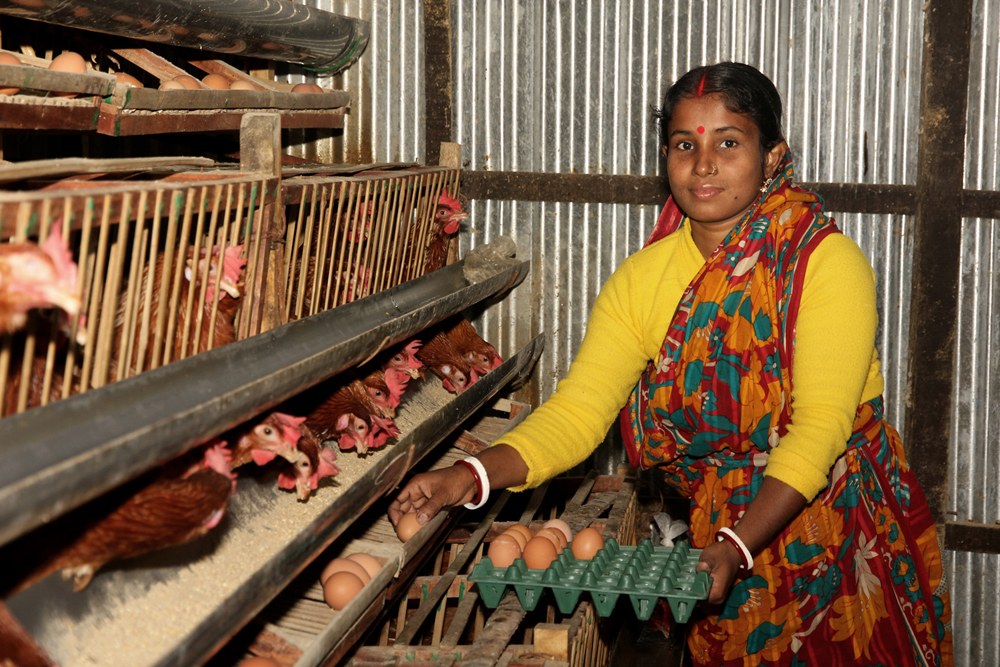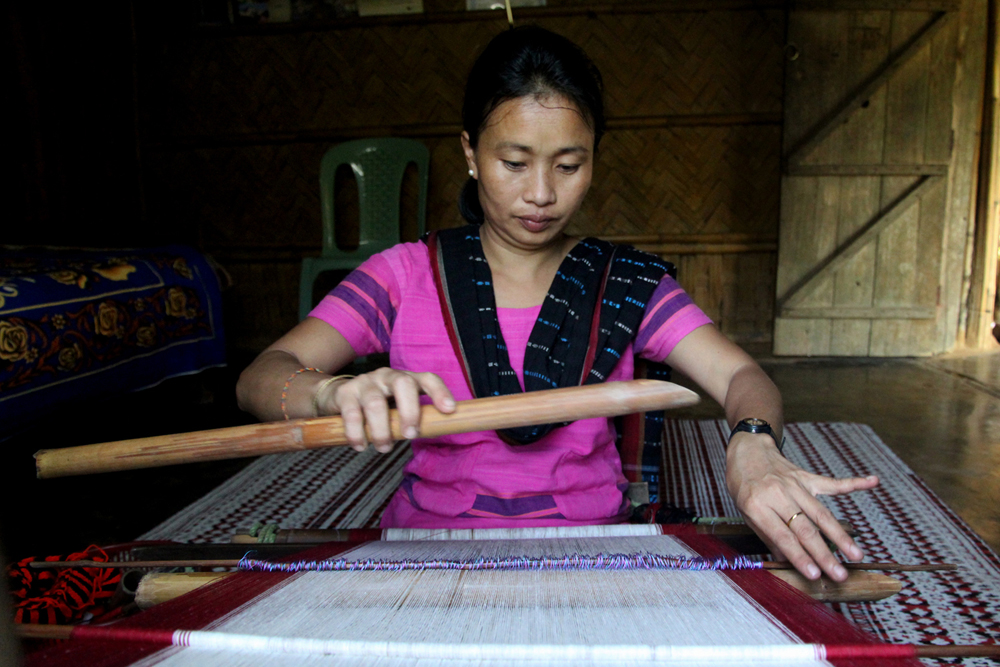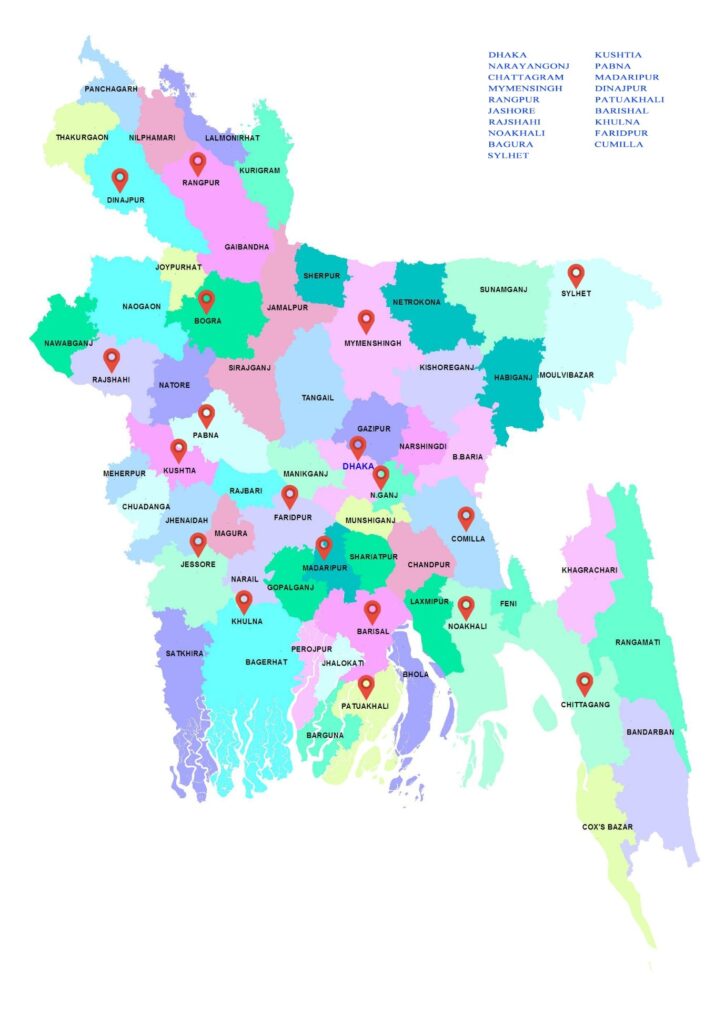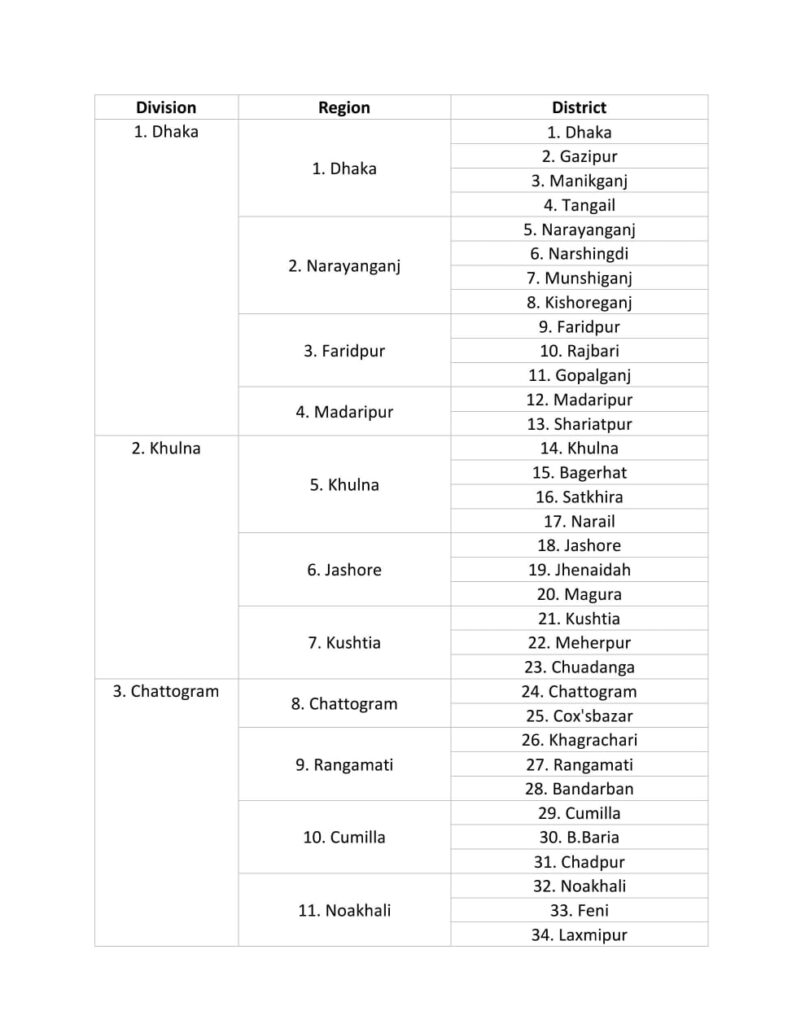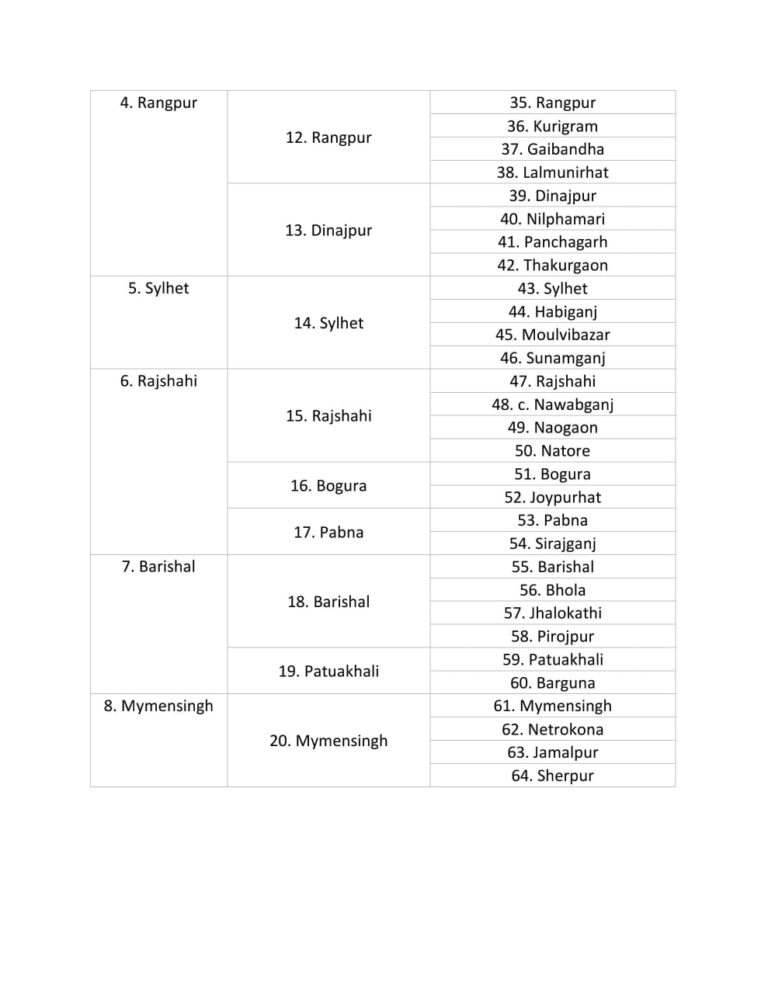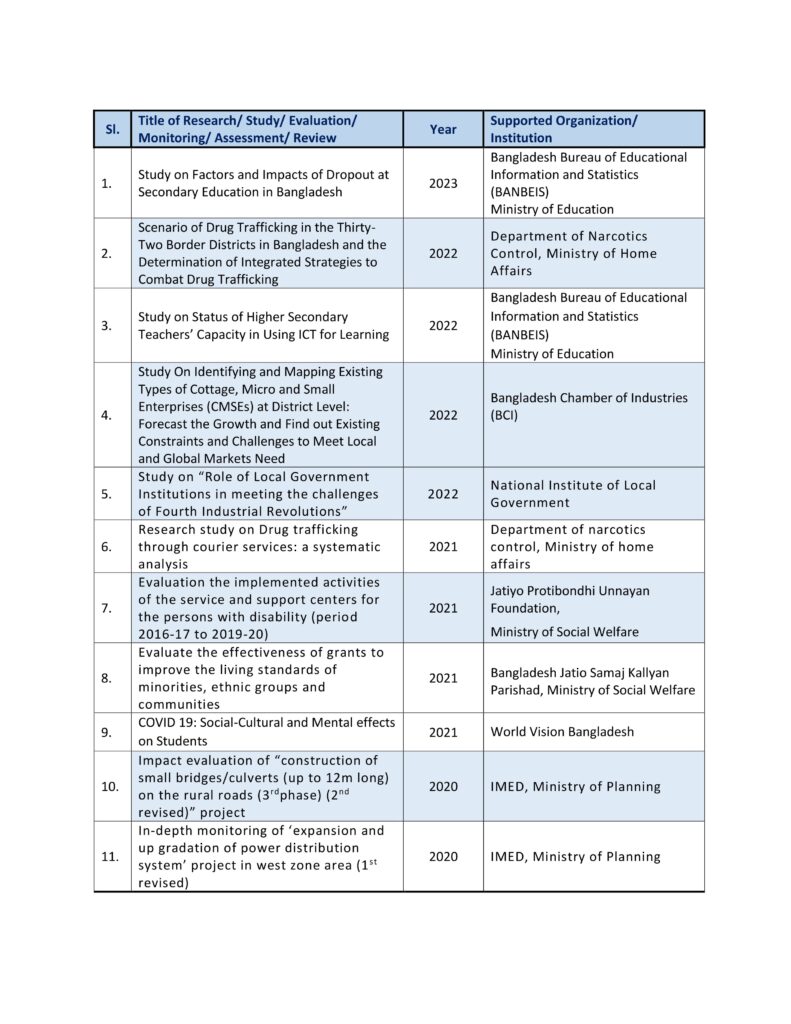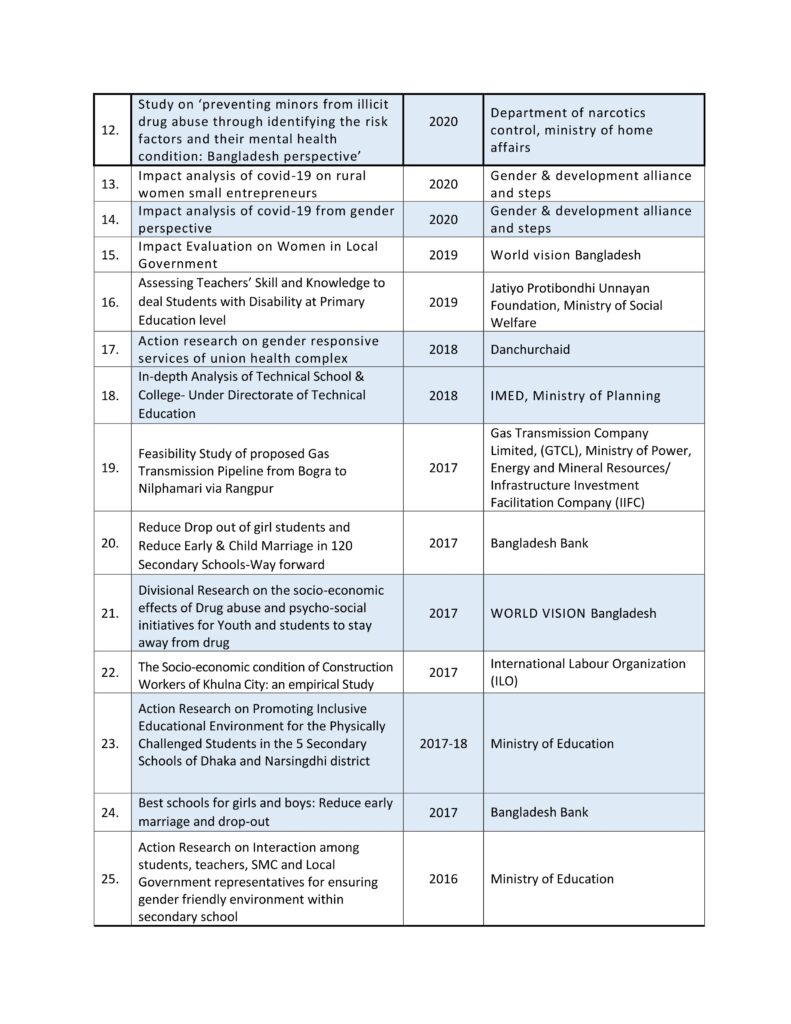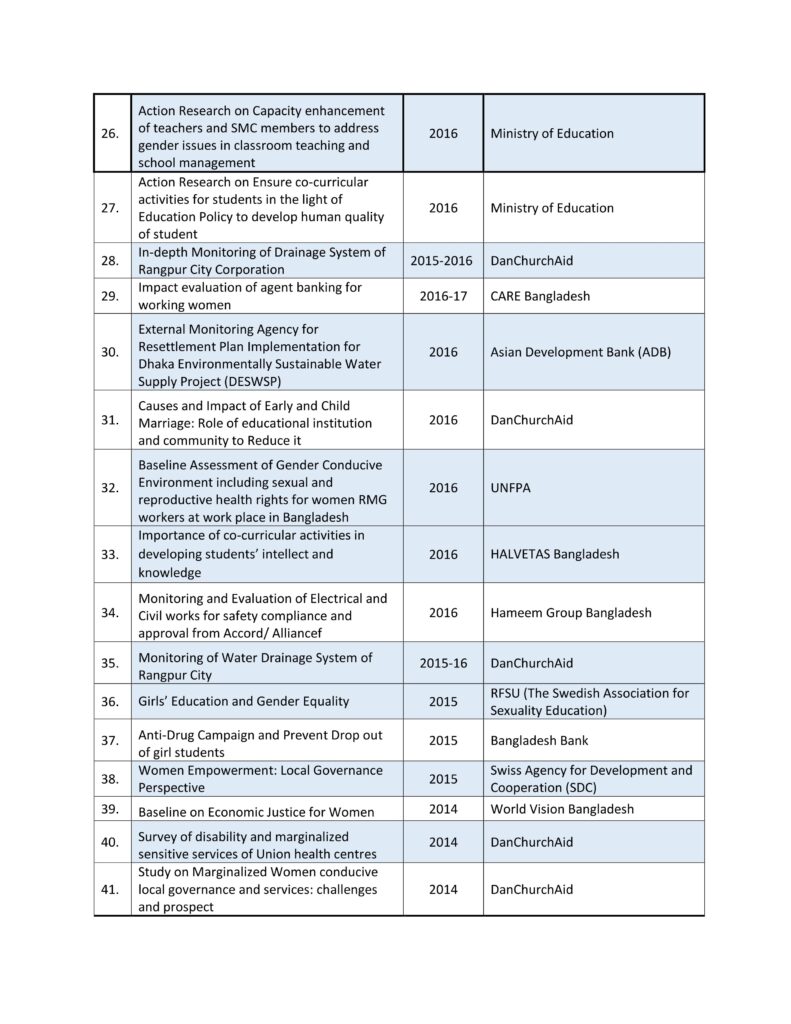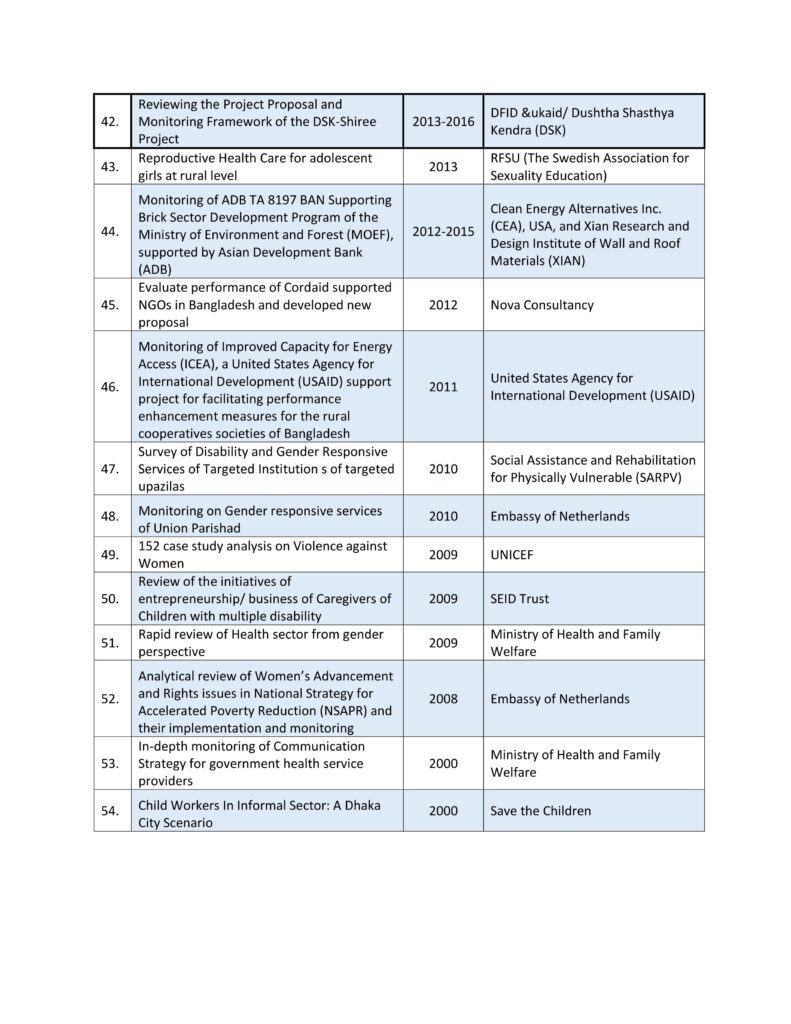Supporting LGED in Monitoring Female Engagement, Gender-Based Violence (GBV) and Risks Management in Rural Bridges Program (SupRB)
Local Government Engineering Department (LGED) under the Local Government Division (LGD) of the Ministry of Local Government, Rural Development and Co-operatives is implementing the Program for Supporting Rural Bridges (SupRB) with financing from the International Development Association (IDA), member World Bank Group (WBG). The main objectives of the program are enhancing rural connectivity, improving the preservation and climate resilience of rural bridge assets, and strengthening institutional capacity for the development, maintenance, and management of the rural bridge assets. The SupRB program started in 2019.
It is assumed that the SupRB implementation may create GBV risks, as there is an influx of women labor force along with project workers, LGED staff, consultants and contractors at the project sites. The NGO services are required to assist LGED in general and the Gender and Development Forum in particular in evaluating, preventing, and mitigating the possible risks of gender-based violence and ensuring women’s engagement in implementing the program by establishing and nurturing an informal organization consisting of the local stakeholders. Steps Towards Development (Steps) showed its interest to be involved in this endeavor and in providing consulting services and thus submitted a Request For Proposal (RFP) accordingly. The organization was later selected as the consulting firm for supporting LGED in monitoring female engagement, gender-based violence (GBV) and risks management in rural bridges program (SupRB) following due selection process. The contract signing took place on 12 October with a project effective date from 20 October 2022. This assignment has commenced in October 2022 and will continue up to 18 months (April 2024) or any other period subsequently agreed by the parties.
Objectives of the Project
The specific objectives of the NGO services include:
- Assist LGED in monitoring women’s engagement
- Guide employment and equality of women in all development activities under the Program
- Prevent, mitigate and evaluate possible project-induced GBV, including SEA/SH incidences by establishing and nurturing an informal organization consisting of the local stakeholder at the bridge
- Respond to the GBV incidents
- Develop institutional integration and management capacity of Gender and Development Forum in LGED
The NGO must understand the requirements of the Gender and Development Forum and Gender Equality Strategy of LGED and must follow the SupRB Program requirements. In general, the Scope of the Services include, but will not necessarily be limited to, awareness building, reporting, referring, and pursuing support (legal, medical, psycho-social) to the survivors, ensuring women participation in program activities so that the women workers can be encouraged to participate and receive tangible benefits from the program. In short, the activities will be:
- Assessment of risks and existing mechanism
- Strengthening Institutional Capacity
- Develop or adopt a standard Gender-Based Violence Grievance Redress Mechanism (GRM)
- Mapping institutional arrangement
- Support services to survivors
- Supporting communication activities
- Procedure
- Monitoring women’s engagement
- Any other activities as advised by the Program Director, PMU and LGED
Geographical coverage of the project
This project is being implemented throughout 19 LGED regions under 8 divisions of the country.
Study on Factors and Impacts of drop out at Secondary Education in Bangladesh
Steps Towards Development is currently conducting a Study on “Factors and Impacts of drop out at Secondary Education in Bangladesh” in association with Bangladesh Bureau of Educational Information, and Statistics (BANBEIS), Ministry of Education during May-June 2023. The study will be conducted in 32 Upazila under 16 districts of 8 divisions of Bangladesh.
The 16 districts will be chosen from the 8 divisions considering their geographic diversity and prevailing situations in education sector. A total of respondents from 320 Secondary Educational Institutions [192 Schools, 96 Madrasahs, 32 Technical Schools] will be selected from this area for the study. At he the end of the study, a report will be submitted after collection, processing and analyzing quantitative and qualitative data from the Field.
Bangladesh has emerged as the fastest-growing financial system globally, with an accelerating pace in GDP. However, the brand-new estimated poverty charge pronounced by not less as per Finance Ministry revelation. Still, about one-fifth component of the country’s complete populace lives beneath the poverty line. Poverty has a merciless impact on education, specifically in case of dropouts. According to Bangladesh Bureau of Educational Information and Statistics (BANBEIS) data, the dropout rate is the highest in secondary education (37.6%). Corresponding figures for primary and upper secondary levels are 34.8% and 19.6% respectively.
It was observed that the dropout rates more increased in the time of Covid-19 pandemic. The steady increase in the number of school dropouts has plunged Bangladesh back into a number of societal issues, namely child marriage and child labor. This proposed research is aimed to find out reasons and factors of drop out from different perspectives along with socio-economic, institutional, educations etc. and simultaneously try to give effective strategy plan to reduce the dropout rate effectively.
Objectives of the Project
- To find out the drop-out trends for last five years at the secondary education in Bangladesh.
- To identify the factors causing drop-outs at secondary education in Bangladesh.
- To explore the impacts of drop-out issue on school system, family as well as government.
Scope of work
This research may create connection for conducting more in-depth research by the educational sectors under Ministry of Education, Government of the People’s Republic of Bangladesh to –
- Identify last five years drop out trends at the secondary Education
- Find out the major factors and reasons of dropout from different perspectives.
- Identify impacts of drop-out on education system, economy, family, society as well as national development
- To recommend some effective measures to develop integrated and collaborative strategies including effective implementation of that at field level jointly and separately by relevant agencies for decreasing drop out of student at secondary education
- To recommend measures for handling adverse Covid-19 impact in education sectors in Bangladesh
- To propose an overall work plan for reducing drop out in secondary education
- Identify and recommended best practices for reducing secondary education and replicate the practices in all over the country.
Study Areas
32 Upazilas under 16 districts of eight divisions in Bangladesh under 16 districts
Some major projects and studies implemented by Steps in recent years
- Steps conducted a study on “Status of Higher Secondary Teachers’ Capacity on using ICT for Blended Learning” in 64 Upazila and 16 districts under 8 divisions of the country from June to December 2022. This project was financed by BANBEIS, Ministry of Education. Like all other Steps projects, this project too will give importance on gender aspects in all stages.
- A Study on “Identifying and Mapping Existing Types of CSME in Bangladesh” was conducted during January–December 2022 funded by SME Foundation. This project has implemented in 8 divisions and 64 districts and it is keen to promote and protect rights of small women entrepreneurs.
- Study on “Scenario of Drug Trafficking in the Thirty-two Border Districts in Bangladesh and the Determination of integrated Strategies to Combat Drug Trafficking” is currently running (January-June 2022) in 32 districts under 6 divisions. Like all other projects of Steps, this project also considers gender perspectives/gender concerns in all phases e.g. questionnaire development and interview process, data collection, data analysis and reporting etc.
- “Evaluation of the Implemented Activities of the Service and Support Centers for the Persons with Disability” (Period 2016-17 to 2019-20) funded by Jatiyo Protibondhi Unnayan Foundation, Ministry of Social Welfare was implemented in 25 districts of 8 divisions. In different activities of this project, violence against women with disabilities was well addressed.
- Study on ‘Preventing minors from illicit drug abuse through identifying the risk factors and their mental health condition: Bangladesh perspective’ (1 January to June 2020) was funded by Department of narcotics control, ministry of home affairs and implemented in 8 divisions and 64 districts. This project addressed abuse and mental health issues of minor girls.
- “Evaluate the effectiveness of grants to improve the living standards of minorities, ethnic groups and communities” (1 January to June 2021) funded by Bangladesh Jatiyo Samaj Kallyan Parishad, Ministry of Social Welfare. This project was implemented in 2 divisions, 6 districts and 6 upazilla and gave special attention on VAW against minority and ethnic women.
- Project titled ‘APARAJITA- Political Empowerment of Women’ supported by HELVETAS Swiss Intercooperation Bangladesh and funded by Swiss Agency for Development and Cooperation-SDC (Project Duration: 2011-2022). This project was implemented in 3 districts and 11 upazila of Barishal Division. Combating VAW and promote women human rights by engaging women elected representatives were one of the major priority focus of this project.
- Research on ‘Drug trafficking through courier services: A systematic analysis’ (1 December 2020 to June 2021) was funded by Department of narcotics control, Ministry of Home Affairs and implemented in 32 Districts of 8 divisions.
- Project titled ‘Local Governance Program- SHARIQUE (PHASE- IV)’ supported by HELVETAS Swiss Intercooperation Bangladesh and funded by Swiss Agency for Development and Cooperation-SDC (Project Duration: 2017-2019 and working area was 10 Upazila and 1 district of Barishal Division). Inclusion of VAW, early marriage and SRHR issues in Local Government’s gender budget and planning was a major part of activities in that project.
- Project titled ‘Best School for Girls and Boys’ (1 January 2017 to December 2017); supported by Bangladesh Bank. This project focused on ensuring violence-free and gender responsive educational institutes and worked in 437 schools of the Steps working area.
- ‘Strengthening Civil Society Participation for CEDAW Implementation in Bangladesh’ supported by UN Women (Project Duration: 2012-2019) in 6 divisions and 18 districts. Noteworthy, VAW is a cross cutting issue of CEDAW convention. Being the Secretariat of CIC-BD platform, Steps continues to play the coordinating role among the member organizations.
- Project titled ‘AGNIJITA- Political Empowerment of Marginalized Women through Responsive Governance and Services’ supported by DanChurch Aid-DCA (Project Duration: 2013-2016) widely addressed VAW against marginalized women and implemented in 3 Division (Rajshahi, Barishal & Mymensing), 3 district and 5 upazilla.
- Project titled `Strengthening Movement to Advance Women’s Rights and Gender Equality’ funded by EKN, Embassy of Sweden and Oxfam Novib, implemented in 6 divisions, 18 districts and 255 upazilla in Bangladesh during October 2009 to September 2014.
Experience in quantitative and qualitative research
Steps conducted many quantitative and qualitative researches in its working phase. In last few years it has conducted some major studies such as in 2022 conducted study on “Identifying and Mapping Existing Types of Cottage, Micro and Small Enterprises (CMSEs) at District Level: Forecast the Growth and Find out Existing Constraints and Challenges to Meet Local and Global Markets Need” supported by Bangladesh Chamber of Industries (BCI). The study done in 64 districts showing the status of CMSEs including human resources, production and marketing strategies.
Study on “Status of Higher Secondary Teachers’ Capacity in Using ICT for Learning” was conducted in 2022 with the support of Bangladesh Bureau of Educational Information and Statistics (BANBEIS), Ministry of Education. The study objective was to find out higher secondary teachers’ capacity in using ICT devices and their needs for improvement. The study conducted in 16 districts.
In 2022, it also has conducted Study On “Scenario of Drug Trafficking in the Thirty-Two Border Districts in Bangladesh and the Determination of Integrated Strategies to Combat Drug Trafficking” with the support of Department of Narcotics Control, Ministry of Home Affairs. The study revealed status of drug trafficking in 32 border districts along with strategy, challenges and way forwards for reducing drug trafficking.
Research study on “Drug trafficking through courier services: a systematic analysis” was done in 2021 with the support of Department of narcotics control, ministry of home affairs. The study was done to find out the strategy and pushing factors for increasing drug trafficking through courier services in recent days. It also showed some way forwards for combating the drug trafficking.
Experience of in-depth monitoring
Steps has conducted a number of In-depth monitoring over the tenure of its working. In 2020, it has conducted ‘Expansion and upgradation of power distribution system’ project in west zone area (1st revised), supported by IMED, ministry of planning. The focus area of this study was to assess the status of implementation of project tasks as well as its impacts on stakeholders. Ongoing and potential challenges also identified.
It has also conducted an In-depth monitoring on “Communication Strategy for government health service providers” in 2000, supported by Ministry of Health and Family Welfare. The study was conducted in selected rural and urban areas for identifying the challenges and possible measurement for improving the communication strategies of government health service providers.
During 2015-2016, it has conducted In-depth Monitoring on “Drainage System of Rangpur City Corporation’ supported by DanChurchAid. Identifying the status of drainage system Rangpur City and how it is affecting the life of urban people was the focus area of that assignment.
Experience in impact evaluation
In 2020 Steps conducted an Impact evaluation on “Construction of small bridges/culverts (up to 12m long) on the rural roads (3rd phase, (2nd revised)” project supported by IMED, Ministry of Planning. The aim of the assigned task was to see the impact and effectiveness of constructed bridges on residents of the project areas.
“Impact analysis of Covid-19 on rural women small entrepreneurs” also conducted in 2020, supported by Gender & Development Alliance and steps. The analysis identified the adverse impact of Covid-19 pandemic on small entrepreneurs especially on women. In the same year, Steps also conducted an impact analysis to see the impact of Covid-19 from the gender perspective. This analysis also done with the support of Gender and Development alliance.
In 2019, Steps conducted Impact Evaluation on Women in Local Government supported by World Vision Bangladesh. The focus of that study was identifying women’s contribution in local government, and how it is improving the services of local government.
Experience in policy review
Steps reviewed policies and documents for government, development partners and civil society organization several times. In 2009, it has reviewed “The initiatives of entrepreneurship/business of Caregivers of Children with multiple disability” with the support of SEID Trust. In the same year, it conducted Rapid review of Health sector from gender perspective, supported by Ministry of Health and Family Welfare. The review revealed challenges and potentiality of health sector in the gender lens.
An Analytical Review was done on Women’s Advancement and Rights issues in National Strategy for Accelerated Poverty Reduction (NSAPR) and their implementation and monitoring in 2008 for The Embassy of Netherlands.
Experience in baseline survey
Steps, in association with UNFPA, conducted a Baseline Assessment of Gender Conducive Environment including sexual and reproductive health rights for women RMG workers at work place in Bangladesh in 2016. The study revealed the condition of women workers of RMG sectors in the gender perspective. Total 10 RMG factories were selected under this study.
A Baseline on “Economic Justice for Women” was conducted by Steps in 2014 for World Vision Bangladesh. Women labor’s economic conditions and fair justice in case of wages were identified through this study. Steps conducted a Feasibility Study during 2017 for Gas Transmission Company Limited, (GTCL), Ministry of Power Energy and Mineral Resources as well as Infrastructure Investment Facilitation Company (IIFC). The focus area of the study was
List of all grants received in the last 5 years:
Government Fund:
Donor name: Ministry of Planning (IMED)
Project name: In-depth monitoring of ‘expansion and up gradation of power distribution system’ project in west zone area (1st revised)
Project duration: (January-2020- June-2020)
Donor name: Ministry of Planning (IMED)
Project name: Evaluation the implemented activities of the service and support centers for the persons with disability (period 2016-17 to 2019-20)
Project duration: (January-2020- June-2020)
Donor name: Ministry of Home Affairs (Department of Narcotics Control)
Project name: Preventing minors from illicit drug abuse through identifying the risk factor and their mental health condition:
Bangladesh perspective
Project duration: (March-2020-December-2020)
Donor name: Ministry of Home Affairs (Department of Narcotics Control)
Project name: Research study on Drug trafficking through courier services: a systematic analysis
Project duration: (January-2021-June-2021)
Donor name: Ministry of Social Welfare (Jatiyo Protibondhi Unnayan Foundation)
Project name: Evaluation the implemented activities of the service and support centers for the persons with disability (period 2016-17 to 2019-20)
Project duration: November-2020 to April-2021)
Donor name: Ministry of Social Welfare (Bangladesh Jatio Samaj Kallyan Parishad)
Project name: Evaluate the effectiveness of grants to improve the living standards of minorities, ethnic groups and communities
Project duration: January-2021-June-2021
Donor name: Ministry of Home Affairs (Department of Narcotics Control)
Project name: ‘Scenario of Drug Trafficking in the Thirty-Two Border Districts in Bangladesh and the Determination of Integrated Strategies on
Combat Drug Trafficking’
Project duration: (January-2022-June-2022)
Donor name: Ministry of Education
Project name: “Study on Status of higher secondary teachers’ capacity on using ICT for blended learning” (BANBEIS)
Project duration: (April-2022 – June-2022)
Foreign Donor Fund:
Donor name: UN Women-Bangladesh
Project name: ‘Strengthening Civil Society Participation for CEDAW Implementation in Bangladesh’
Project duration: (January-2018-October-2018)
Donor name: HELVETAS Swiss Interoperation Bangladesh
Project name: ‘‘Local Governance Program- SHARIQUE (PHASE- IV) implemented during 2017 -2019
Local Governance Program- SHARIQUE (PHASE- IV) implemented during 2017 -2019
Project duration: (October-2018-December-2022)
Donor name: Embassy of Switzerland, Swiss Agency for Development and cooperation
Project name: ‘APARAJITA-Political Empowerment of Women-Phase II’
Project duration: (December-2015-February-2017)

